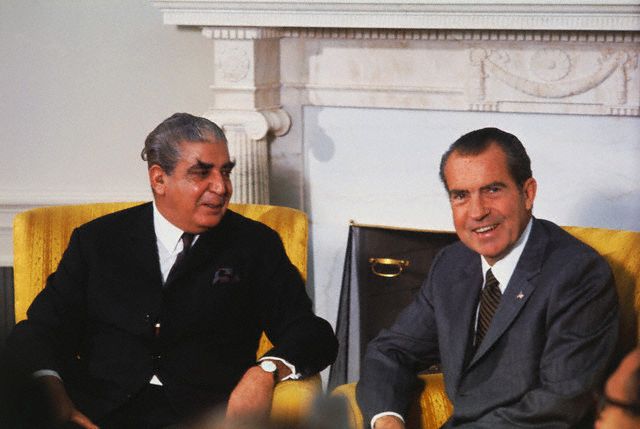In Pakistan, America-bashing is a favourite pass-time of not only laymen but members of intelligentsia also. With regard to the East Pakistan crisis that took a serious turn after President General Yahya Khan postponed the scheduled session of the Constituent Assembly on 1 March 1971 and the Awami League responded by launching an extremely violent non-cooperation movement the same is the attitude. Pakistan government resorted to military action on 25 March 1971 prompting the Awami League to declare independence of Bangladesh. The declassified State Department Documents, the Nixon Tapes of Oval Office, “The Memoirs of Richard Nixon” by Richard Nixon and “White House Years” by Henry A. Kissinger have provided sufficient material to establish that President Richard Nixon did his best to achieve a political solution of the East Pakistan crisis and to deter India from committing aggression against Pakistan. Not only President Nixon advised the Pakistan government to arrive at a political settlement of the issue instead of continuing with the military action but on his part was anxious to play a helpful role in paving the way for such a settlement by reaching to the Awami League leaders who had fled to India. The US efforts were thwarted by the Indian government which did not want to miss the chance to dismember Pakistan.

Right in the middle of the East Pakistan crisis, Pakistan served as a bridge between the United States and China by arranging secret visit of US Secretary of State Henry Kissinger to Beijing which proved successful in bringing about a rapprochement between the two Great Powers. President Nixon understood that Pakistan had to pay dearly for its role because it resulted in the conclusion of India-Soviet Union Treaty of Friendship and Cooperation in August 1971. Often the United States is blamed for not coming to Pakistan’s assistance during the India- Pakistan War of 1971 despite the fact that Pakistan was a member of CENTO and SEATO and had a bilateral Defence Agreement. This viewpoint ignores the fact that the American commitment to Pakistan was only in the case of threat or aggression from International Communism. During the India-Pakistan War of December 1971, the United States, along with China, wanted the UN Security Council to adopt resolution calling for ceasefire and withdrawal of troops by the two sides. However, the Soviet Union foiled all such attempts by exercising vetoes. But the most significant act of President Nixon for which Pakistan is under American obligation was his stand that the United States would not allow India to have complete victory over Pakistan through military aggression. During the crisis President Nixon instructed Kissinger to remain in contact with Soviet Charge d’affairs Yuly Vorontsov through whom messages were sent to the General Secretary of Soviet Communist Party, Leonid I. Brezhnev, to restrain India and at critical moments used the ‘hotline’ for the same purpose.
Pakistan armed forces surrendered in East Pakistan on 16 December 1971. The same evening President General Yahya Khan in his address to the nation showed the resolve to continue the war. But the bitter reality was that India had moved into Pakistan-administered Kashmir and had also occupied more than 5,500 sq. miles of territory in West Pakistan. It would have been a gigantic task, demanding great sacrifices and courage, to check Indian advance. Perhaps Indian intention was to capture the whole of Azad Kashmir and penetrate deep into West Pakistan causing disruption between Punjab and Sindh. It was under American pressure that India was obliged to offer ceasefire to Pakistan with effect from midnight on 17 December 1971 which Pakistan government accepted. In his Memoirs, President Nixon says: “By using diplomatic signals and behind-the-scenes pressures we had been able to save West Pakistan from the imminent threat of Indian aggression and domination.” In his book “White House Years”, Kissinger claims that India had reluctantly agreed to restrain itself under pressure from the Soviet Union “which in turn grew out of American insistence, including the [Seventh] fleet movement and the willingness to risk [Moscow May 1972] summit.” Subsequent to the East Pakistan debacle, the United States under President Nixon declared the existence of independent (West) Pakistan a corner-stone of America’s South Asia policy.